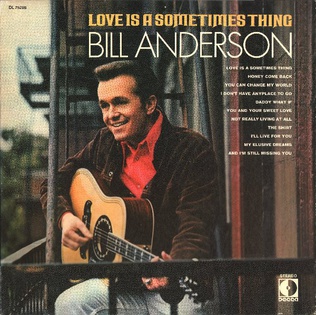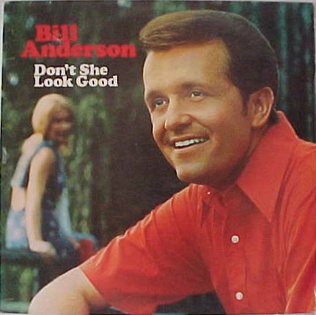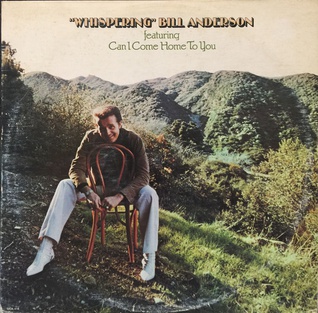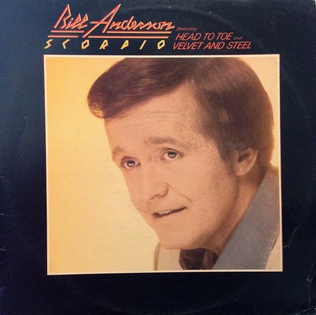"Peanuts and Diamonds" is a song written by Bobby Braddock. It was first recorded by American country singer-songwriter Bill Anderson. It was released as a single in 1976 via MCA Records and became a major hit the same year.
"Liars One, Believers Zero" is a song written by Glenn Martin. It was first recorded by American country singer-songwriter Bill Anderson. It was released as a single in 1976 via MCA Records and became a major hit the following year.

I Love You Drops is a studio album by American country singer-songwriter Bill Anderson. It was released in August 1966 on Decca Records and was produced by Owen Bradley. It was Anderson's fifth studio release and included three singles that became major hits on the Billboard country chart. The album would also become a success on the Billboard country albums list upon its release, becoming one of his most successful charting albums.

Love Is a Sometimes Thing is a studio album by American country singer-songwriter Bill Anderson. It was released in June 1970 on Decca Records and was produced by Owen Bradley. It was Anderson's fourteenth studio album since signing with the Decca label in 1958. Its only single, the title track, would become a major hit on the Billboard country chart in 1970. The album itself would also reach peak positions on the country albums chart following its release.

Where Have All Our Heroes Gone is a studio album by American country singer-songwriter Bill Anderson. It was released in December 1970 on Decca Records and was produced by Owen Bradley. It was Anderson's fifteenth studio album as a recording artist and his third studio album released in 1970. The album's title track became a major hit on the Billboard country chart. The album itself would also reach peak positions on the Billboard country albums chart.

Don't She Look Good is a studio album by American country singer-songwriter Bill Anderson. It was released in November 1972 on Decca Records and was produced by Owen Bradley. The album was Anderson's twentieth studio recording to be issued. It was also his fourth studio album released in 1972. Two additional projects were collaborations with Jan Howard earlier in the year. The album's only single was the title track, which became a major hit on the country charts.

Bill is a studio album by American country singer-songwriter Bill Anderson. It was released in July 1973 on MCA Records and was produced by Owen Bradley. It was Anderson's first studio album to be released on the MCA label after Decca Records merged with the label. It was also his twenty first studio recording to be released and only album project to be issued in 1973. The album included three singles, two of which became number one hits in either the United States and Canada. The album itself also would reach peak positions on national publication charts.

"Whispering" Bill Anderson is a studio album by American country singer-songwriter Bill Anderson. It was released in June 1974 on MCA Records and was produced by Owen Bradley. The album's only single was the track "Can I Come Home to You". It was also his twenty-second studio recording and only album issued in 1974.

Every Time I Turn the Radio On/Talk to Me Ohio is a studio album by American country singer-songwriter Bill Anderson. It was released in January 1975 on MCA Records and was produced by Owen Bradley.

Peanuts and Diamonds and Other Jewels is a studio album by American country singer-songwriter Bill Anderson. It was released in September 1976 on MCA Records. It was co-produced by Owen Bradley and Buddy Killen. It was Anderson's twenty fifth studio recording released during his musical career and second to be released in 1976. The album included three singles issued between 1975 and 1976, two of which became major country hits in both the United States and Canada.

Scorpio is a studio album by American country singer-songwriter Bill Anderson. It was released in April 1977 on MCA Records and was produced by Buddy Killen. Scorpio was Anderson's 26th studio album as a recording artist and first album release of 1977. Another album would follow later in the year. The project produced two singles that became major hits.

Billy Boy & Mary Lou is a studio album by American country music artists Bill Anderson and Mary Lou Turner. It was released in June 1977 on MCA Records and was produced by Buddy Killen. It was the duo's second studio album together since pairing up as a duet team in the mid 1970s. The album produced two singles between 1977 and 1978. It would be the duo's final studio album together.

Ladies Choice is a studio album by American country singer-songwriter Bill Anderson. It was released in 1979 on MCA Records and was produced by Buddy Killen. His 29th studio album, Ladies Choice, produced two singles that became charting singles on the Billboard country chart. It included a mix of songs composed by Anderson and other songwriters.
"If You Can Live with It " is a song written and recorded by American country singer-songwriter Bill Anderson. It was released as a single in 1973 via MCA Records and became a major hit the same year.
"Can I Come to You" is a song written by Jerry Crutchfield and Buddy Killen. It was recorded by American country singer-songwriter Bill Anderson. It was released as a single in 1974 via MCA Records and became a major hit the same year.
"I Still Feel the Same About You" is a song written and recorded by American country singer-songwriter Bill Anderson. It was released as a single in 1975 via MCA Records and became a major hit the same year.
"Thanks" is a song recorded by American country singer-songwriter Bill Anderson. It was written by Bill Martin and Phil Coulter and previously recorded by J. Vincent Edwards in 1969. Bill Anderson's version was released as a single in 1975 via MCA Records and became a major hit the same year.
"Head to Toe" is a song written by Bobby Braddock. It was first recorded by American country singer-songwriter Bill Anderson. It was released as a single in 1977 via MCA Records and became a major hit the following year.
"That's What Made Me Love You" is a song written by Lawrence Shoberg. It was first recorded as a duet by American country artists Bill Anderson and Mary Lou Turner. It was released as a single in 1976 via MCA Records and became a major hit the same year.
"Where Are You Going, Billy Boy" is a song written by Dave Kirby and Glenn Martin. It was first recorded as a duet by American country artists Bill Anderson and Mary Lou Turner. It was released as a single in 1977 via MCA Records and became a major hit the same year.











